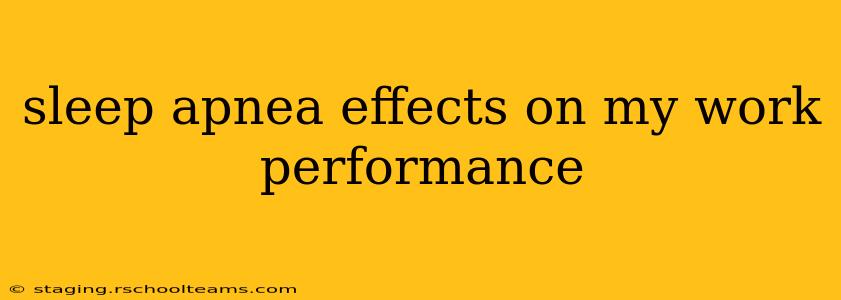Sleep apnea, a condition characterized by pauses in breathing during sleep, significantly impacts more than just your rest. Its effects ripple into your waking hours, profoundly affecting your work performance and overall well-being. This comprehensive guide explores the various ways sleep apnea can hinder your professional life, offering insights and solutions to improve your productivity and health.
How Does Sleep Apnea Affect My Work Performance?
The fragmented sleep caused by sleep apnea leads to daytime fatigue, significantly impacting cognitive function and work performance. This fatigue isn't simply feeling tired; it's a pervasive lack of alertness that affects concentration, memory, and decision-making abilities. You might find yourself struggling with even simple tasks, experiencing "brain fog" and reduced productivity throughout the workday.
What Are the Common Symptoms of Sleep Apnea Affecting Work?
Many individuals suffering from sleep apnea are unaware of the condition's impact on their work. Recognizing the symptoms is crucial for seeking help and improving your professional life. Common work-related symptoms include:
- Excessive daytime sleepiness: Feeling constantly tired, struggling to stay awake during meetings or presentations.
- Difficulty concentrating: Finding it hard to focus on tasks, making frequent errors, or experiencing "brain fog."
- Reduced productivity: Completing less work than usual, taking longer to finish tasks, or needing more breaks.
- Irritability and mood swings: Experiencing increased frustration, anger, or emotional volatility.
- Poor memory and recall: Forgetting appointments, details, or instructions.
- Increased risk of accidents: Feeling drowsy while operating machinery or driving, potentially leading to accidents.
Can Sleep Apnea Cause Me to Make Mistakes at Work?
Absolutely. The cognitive impairment caused by sleep apnea directly increases the likelihood of making mistakes at work. Reduced concentration, poor judgment, and slower reaction times can lead to errors in calculations, reports, presentations, and even more serious consequences depending on your profession. The cumulative effect of these errors can severely impact your performance reviews and professional standing.
How Can I Improve My Work Performance if I Have Sleep Apnea?
Addressing sleep apnea is crucial for improving work performance. This involves a multi-pronged approach:
- Seeking medical diagnosis and treatment: A sleep study (polysomnography) can confirm a diagnosis, and various treatment options are available, including CPAP therapy, oral appliances, and in some cases, surgery.
- Improving sleep hygiene: Establishing a regular sleep schedule, creating a conducive sleep environment, and avoiding caffeine and alcohol before bed.
- Managing stress: Stress exacerbates sleep apnea symptoms. Implementing stress-reducing techniques like exercise, meditation, or yoga can significantly improve sleep quality.
- Regular exercise: Physical activity promotes better sleep patterns. Aim for regular, moderate exercise but avoid strenuous workouts close to bedtime.
- Healthy diet: Maintaining a balanced diet can contribute to better sleep and overall well-being.
What If My Employer Doesn't Understand My Sleep Apnea?
Openly communicating your condition with your employer can be challenging, but it's essential for managing your workload and expectations. Consider providing medical documentation to support your need for adjustments, such as flexible work arrangements or shorter workdays. Many employers are understanding and willing to accommodate employees with health concerns.
Is There a Link Between Sleep Apnea and Workplace Accidents?
Yes, there is a strong correlation. Excessive daytime sleepiness significantly increases the risk of workplace accidents. Individuals with untreated sleep apnea are more likely to experience lapses in concentration and slower reaction times, putting themselves and others at risk.
How Can I Talk to My Doctor About Sleep Apnea and Its Effect on My Job?
Be prepared to discuss your symptoms, including specific examples of how sleep apnea impacts your work performance. Bring a list of questions you may have regarding diagnosis and treatment options. Your doctor can help you understand the severity of your condition and recommend appropriate treatment strategies. Don't hesitate to voice your concerns about the impact on your professional life—your doctor is there to help.
By addressing sleep apnea proactively, you can significantly improve your work performance, reduce stress, and enhance your overall well-being. Remember, seeking professional help is a crucial first step towards a healthier and more productive life.
